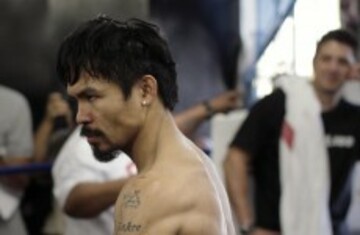“THAT FIGHT WILL never, ever happen. Never, ever happen because of Mayweather.”
The above prediction, volunteered by promoter Bob Arum this week, should send a shiver down the spine of every sports fan.
He is, of course, referring to Floyd Mayweather Jr.’s proposed fight with Manny Pacquiao, an event that looks as far away from finalisation as ever.
The Filipino is currently preparing for his own bout with Juan Manuel Marquez in two weeks time, but as is always the case, media interest has centred on the man he won’t share the ring with.
There are many reasons why this Mayweather v. Pacquiao hasn’t happened. The American’s greed is usually cited as the principal obstruction, but his reluctance to commit is largely due to Manny’s refusal of drug tests close to the night of the fight.
Figures released this week have again underlined the extent to which the fight makes sense in cash terms. HBO have announced that 1.25m Americans bought pay-per-view for Mayweather’s recent contest with Victor Ortiz, virtually matching the number that purchased Pacquiao’s fight with Shane Mosley in May.
Together, the fights earned over $150m, a figure they could easily match should they decide to share the same ring.
Time, however, is fast running out. Bob Arum admits that if they wait much longer to go head-to-head, promoters risk the public perception that both fighters are past their best (a la Lewis-Tyson).
We wait, as ever, with baited breath.
Jabs and Parries
Perhaps more than any other, boxing is a sport of opportunities, both missed and taken.
If Pacquiao-Mayweather doesn’t happen, it has a claim to being the biggest missed opportunity in the history of sport. Last night, however, a Dubliner attempted to take a chance of another kind.
It had been just seven days since Crumlin’s Dean Byrne had stepped into the ring, but after remaining in fighting shape, he was offered the chance to top a televised bill in Manchester, fighting Frenchman Frank Haroche Horta.
Undefeated through 15 contests going into the fight, Byrne was sadly outclassed and quit at the end of Round 8.
In many ways, it was an opportunity he had to take, to boost his profile as much as anything else. The defeat comes as a crushing blow, however, and he’s now faced with the challenge of dusting himself off and starting again.
Byrne got the nod after Frankie Gavin withdrew from his scheduled fight with the Frenchman. Given Gavin’s well-publicized personal problems of late, one hopes he is okay.
This Week in Boxing History
Tomorrow marks the anniversary of one of boxing’s most famous nights, when Muhammad Ali truimphed over George Foreman in the seminal “Rumble in the Jungle,” but since most people are already more than familiar with the events of that night, I’ve decided to write about another heavyweight clash.
By the time he fought Donovon “Razor” Ruddock on October 31st, 1992, Lennox Lewis had already established his reputation as a languid but powerful boxer. He entered the ring with 17 knockouts from 21 career bouts, and left it with having notched an 18th.
A brilliant performance, Lewis’s dismantling of Ruddock was rightly hailed as the best single fight by a British heavyweight for the best part of 100 years.
The fight was a world title eliminator, the winner guaranteed to take on Riddick Bowe. However, rather than fighting Lewis (who had beaten him in the 1988 Olympic Final), Bowe opted to forfeit his WBC title belt, effectively awarding it to Lewis.
He would never fight Lennox Lewis, and to this day it remains a contest that fans argue about. That said, its capacity to generate controversy will pale in significance to that of Mayweather v. Pacquiao should their holdout carry on indefinitely.








Theres a race in papua new guinea, almost 100km, through rain forest on the kokoda trail. Its 500 kina to enter with 10000 kina prize money. The record holder can run it in 16hrs 45 one way and 17hrs 15 the other.
I’m mad me!!